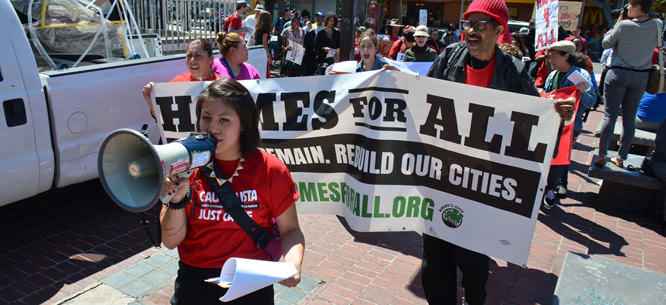A Coalition of Necessity
A Coalition of Necessity
The YIMBYs pair winning political strategy with an inclusive program that will bring relief to victims of the housing crisis across the board.
A reply to Jacob Woocher and Shanti Singh.

Palo Alto, like many Silicon Valley suburbs, is hostile to new housing. Just 3 percent of the city’s land is zoned for apartments, with height limited to four stories, and there are many obstacles even to building within that envelope. In 2013, a referendum vote killed a proposal to build sixty apartments for low-income seniors. Since then the city’s political climate has shifted somewhat, but an influential group of residents still works to limit the city’s population growth to no more than 0.7 percent per year.
The median house price in Palo Alto has passed $3 million. There isn’t a single home currently on sale there for less than $1.5 million. A man who lost his home when the rent went up from $2000 to $3800 is among the hundreds living in RVs in the surrounding area. Local authorities are now driving the RV-dwellers away by enforcing parking rules. Others unable to find $2000-a-month lodging near work move into aging apartment complexes ten or twenty miles away, sending a cascade of scarcity down the economic ladder.
SB 827 aims to halt this dynamic by allowing more homes to be built at all price levels. For Jacob Woocher and Shanti Singh, that is a dangerous distraction. In their view, speculators and global capital, not unmet housing demand, are to blame for rising rents. Blocking construction of for-profit housing will prevent gentrification and preserve affordability.
But in California right now there can be no doubt that scarcity is pushing up prices. The fewer homes built in areas that are already wealthy, the more demand will spill out into poorer neighborhoods. Scholars Miriam Zuk and Karen Chapple, in the very paper that Woocher and Singh cite, find that “both market-rate and subsidized housing reduce displacement pressures.” Anti-gentrification campaigners implicitly admit the importance of supply when they criticize Airbnb for taking units off the market.
Even if it could succeed on its own terms, the anti-gentrification program promises relief to a limited group—“low-income communities of color,” as Woocher and Singh put it—rather than to all who suffer from high rents. Tellingly, they write of “communities displaced and dispossessed by Silicon Valley.” This phrase writes off newly hired coders searching fruitlessly for $2000 apartments as perpetrators alongside their bosses, setting one victim of the housing crisis against another.
To achieve the immediate goal of defeating SB 827, anti-gentrification campaigners have joined (however much some try to deny it) in a common front with wealthy suburbanites. There’s nothing wrong with this in principle, just as there is no principled objection to the YIMBY alliance with builders and tech magnates. Neither activist tendency is in a position to dictate public policy on its own. Success requires coalitions with other interest groups. Builders and exclusionary homeowners, allies a century ago when they created zoning, are now at loggerheads. Which side progressives should partner with is a question of goals and strategy, not of morality.
The narrow focus of anti-gentrification organizing is a strategic weakness. More fundamentally, low-income tenants and wealthy homeowners are unnatural allies. One group’s primary aim is to keep the other out. As a result, anti-gentrification rhetoric is easily misused. Houston’s mayor, the New York Times reports, used the excuse that too few of the units in a new apartment building would be affordable when he acquiesced to segregationists in adjoining wealthy neighborhoods. Beverly Hills argues simultaneously that SB 827 would harm high-end fashion businesses and that it would gentrify the not-so-impoverished city.
The YIMBYs, on the other hand, have an inclusive program, and they share with their coalition partners a common goal of more building. Theirs is the way to a healthy housing politics for the left.
Benjamin Ross is a transit activist in Maryland. His book, Dead End: Suburban Sprawl and the Rebirth of American Urbanism (Oxford University Press, 2014), is about the politics of urbanism and transit.
Read Benjamin Ross’s original article, “A Tangle for the Anti-Development Left.”






